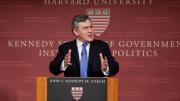Speaking at the Harvard Kennedy School on September 23, former British Prime Minister Gordon Brown called for a “global financial constitution” that would “set down rules and standards not just in one country but across the board.” In the wake of the global financial crisis, he said, such “globally coordinated action” is needed to ensure such a crisis does not occur again.
“This is the first crisis in the global age,” Brown said. “It cannot be solved by simple national solutions… We have a global problem that needs globally coordinated action."
Brown served as prime minister from 2007 until 2010; he had previously spent 10 years as chancellor of the exchequer in the Labour Party’s government. His speech at the Institute of Politics was part of a week-long visit as the Heffernan Visiting Fellow, during which he met with student groups and sat in on classes; the British Telegraph newspaper reported that this was his first major public appearance since losing last May’s elections.
Asked about the specifics of a global financial constitution, Brown said it might require that countries have sufficient capital, liquidity, and cooperation among regulators and supervisors; these requirements would bring confidence in the soundness of participating countries’ financial institutions.
Explaining why he believes such a financial constitution is needed, he said, “Markets need morals. Markets operate in a society and an environment where the values do not come from the market themselves; they come from people.”
Brown also cautioned against a system reliant on protectionism, which, he said, would disrupt trade. Instead, Americans should cater to growing middle classes in India and China. “Their wishes and their desires are not too different from European and American consumers.” They are, he said, “billions of potential customers” for the Western markets to sell to.
Relying on protectionism, he argued further, would only engage the United States in a “race to the bottom” of constantly lowered wages. “That will not, in the end, protect people’s jobs.”
Coordinating such a financial agreement among the world’s countries would not be easy, he said. Brown cited his experience at the 2009 Climate Change Conference in Copenhagen. There, explained, 190 countries came together to try to make a collective decision, but it “turned out to be quite difficult.”
Toward the conversation’s end, a student asked Brown how he saw the future of Britain and the United States.
Brown conceded that many in these countries are anxious about the future, and specifically about employment. But he was optimistic about the countries’ position in a changing global economy.
“The American dream can be renewed by ensuring that people have the skills and education and technology to benefit from what will be a changing world in the years to come. You can compete on high skills,” he said. “There are no countries other than Britain and America that can surpass us in universities.”









